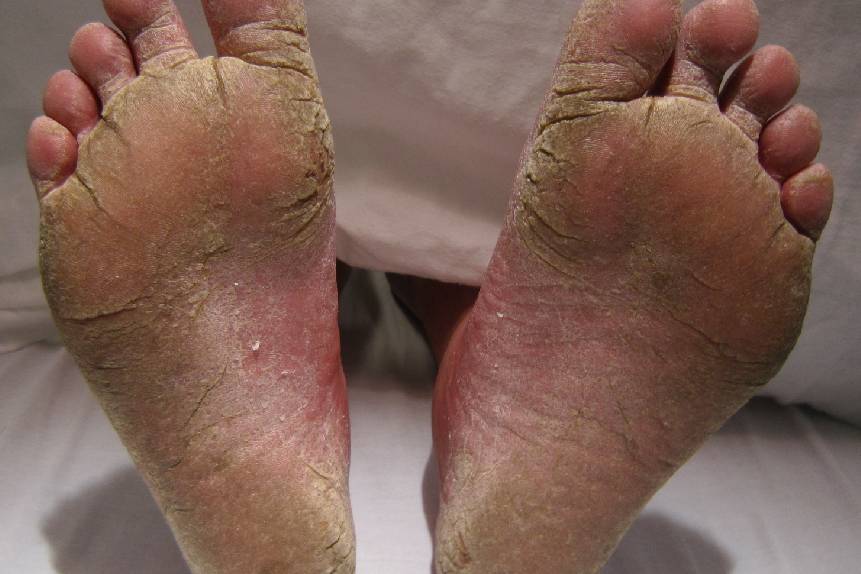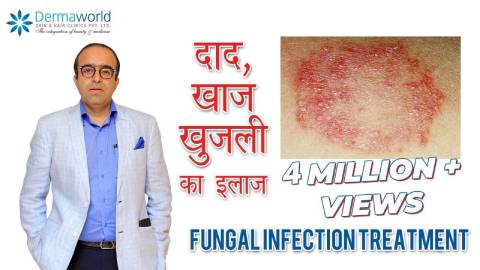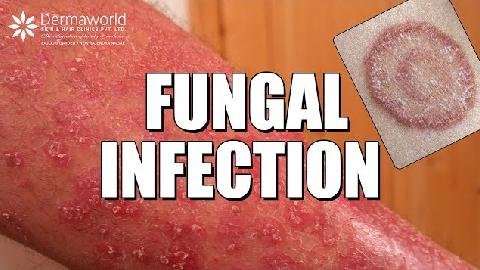
There are various signs and symptoms associated with fungal infection including:
- Itching and pain.
- Cracked or peeling skin.
- Redness and inflamed skin.
- Stinging and burning sensation in the infected area.
Best Fungal Infection Specialist in Delhi, India
Fungal infection is a type of inflammatory infection in which the fungi invade inside the body. The fungus is a primitive organism, and they are present everywhere in the surroundings (soil, air, plants, and water), and mostly found in the warm and moist conditions. Most of the fungi are harmless, but certain types can cause serious infections. The fungi reproduce through tiny spores in the air. Fungal infections can affect the scalp, feet, underarms, groin areas, nails, skin, and any other body parts. Sometimes, the spores are inhaled, and infection often affects the lungs and other body organs as well.
The most common types of fungus that can cause life-threatening infection include
1. Aspergillus
It is a mould, and it causes aspergillosis. It affects people with compromised immune system and lung disease. It can be a severe pulmonary and bloodstream infection. Mostly occur in people with cancer, HIV, and bone marrow transplants.
2. Candida
It is typically found in mouth and intestines and on the skin. It often grows uncontrollably and causes candidiasis. Diabetes, weak immune system, taking antibiotics, high-stress level, high alcohol intake can cause candida overgrowth. It can cause oral thrush, urinary tract infections, sinus infections, and joint pain.
3. Pneumocystis jirovecii
This infection causes fluid build-up in the lungs, and it mainly affects people with a compromised immune system.
Types of fungal infection
Ringworm or dermatophytosis, is the most common fungal infection that causes itchy, red, circular rashes. Ringworm can affect any part of the body and despite of its name, it doesn’t have anything to do with worms. If the ringworm affects groin area, it cause jock itch, and if it affects feet it is called athlete's foot.
Many people also develop fungal nail infection (medically called onychomycosis) which causes nail to become painful, brittle, discolored (white, yellow, green, black), distorted, and thickened. Sometimes, the nail infection also spreads on the nearby skin and it becomes itchy, red, cracked or swollen. The people with compromised immune systems are at increased risk of developing fungal infections.
Vaginal yeast infection caused by Candida albicans, are common in women. This happens when the balance of bacteria and yeast in the vagina is disrupted due to the hormonal imbalance, stress, diet, and other factors. Women often suffer from pain and burning sensation during urination, itching, and swelling in the vaginal area, grey lumps and watery discharge also occur. This infection requires immediate medical attention, as symptoms can worsen if left untreated.
It is necessary to maintain good hygiene to prevent the occurrence of fungal infections, to stop the infection from getting worse or spreading it to others.
Book An Appointment
ALL CLINICS CLOSED ON SUNDAY
Various ways that can help to prevent fungal infections
- 1Wear well fitting shoes and clean socks, that allows the feet to breathe. Apply antifungal powder to the shoes, this prevents the fungal spores from growing.
- 2Discard the old footwear, as it can easily get contaminated with fungi.
- 3Keep your nails short.
- 4Use only sterilised nail salon equipment
- 5Do not share the scissors and clippers with other people.
- 6 Keep the body and hands clean and dry.
- 7Do not walk barefoot in public showers, pools, and locker rooms. Wear shower shoes to protect your feet.
- 8Athlete’s foot easily spreads in gym and swimming pool changing rooms. Be cautious and do not share your towels and clothes.
- 9Treat your pets if they suffer from any type of skin infection, as human beings can catch these infections by stroking them.
- 10Maintain hygiene, and change and wash your undergarments daily.
- 11Take showers daily and even after performing strenuous physical activities.
- 12Avoid wearing tight fitting clothes, wear loose and skin friendly clothes.
- 13Wash your exercise or gym clothes after each use.
Diagnosis and Tests
Fungal culture test, blood culture test, skin rashes, analysis of symptoms is done to determine the type of fungal infection.
Our dermatologists at Dermaworld Skin Clinics will prescribe antifungal tables, antifungal shampoos, and antifungal ointments to treat fungal infections. Dermaworld Skin Clinics provide with an effective and safe treatment for various types of fungal infections, and can help one to achieve a disease-free skin.
There are various signs and symptoms associated with fungal infection including:
- 1. Itching and pain.
- 2. Cracked or peeling skin.
- 3. Redness and inflamed skin.
- 4. Stinging and burning sensation in the infected area.
Frequently Asked Questions
Fungal infection is a common skin problem, which occurs when an invading fungus takes over an area of the body. The symptoms of fungal infections depend on its type. The different types of fungal infections include:
Athlete's foot or Tinea Pedis
- Redness or blisters in the affected area
- Peeling, scaling or cracking in the skin
- Itching, stinging or burning sensation
Yeast Infection
- Itching and swelling around the vagina
- Unusual discharge from the vagina
- Redness and soreness around the vagina
- Diaper rash
- Fungal toenail infections
Jock Itch
- A red rash with circular edges
- Cracking, flaking or dry peeling in the infected area
- Irritation, itching or burning
Ringworm
- Raised, a ring-shaped patch of skin
- Overlapping rings
- A round or flat patch of itchy skin
Fungal infections are highly contagious. It can spread from one body part to another. Fungi mostly occur in the body area that is moist and damp. For example, genitals, underarms, neck, mouth, scalp, feet (between digits), lungs, nails, etc.
A microbe, fungi cause fungal infections. Fungi are present everywhere in the environment, and some species of fungi even live on the skin. The fungus reproduces by spreading microscopic spores, which are often present in the air, soil, or a humid environment. They can affect areas like nails, skin, and hair. The fungal infections also spread by sharing contaminated clothes, gears, towels, and infected toilet seat. Peats, swimming pools, bathing in common bath areas, sexual activities also promote the spread of fungal infections.
Early diagnosis helps to prevent the spreading of fungal infection. To manage the symptoms, one must consult a qualified dermatologist. Traditional approaches to the diagnosis of fungal infections include:
- Physical examination
- Microscopic examination of clinical samples
- Histopathology
- Serology
- KOH
- Culture
Fungal infections can be effectively managed with the help of right medications. Antifungal medications work to treat fungal infections by either killing fungi directly or prevent them from growing further. These medications are available in the form of:
- Creams and ointments
- Antifungal powders
- Pills
- Sprays
- Shampoos
To get rid of the fungal infections, the dermatologist will first check for the symptoms. If the skin feels irritated, red, raised, scaly, and itchy, or the infection spreads to other body parts, one should consult a medical expert immediately. Do not try to apply OTC creams without proper consultation or examination as it could worsen the condition. The dermatologist will provide the best medication to treat the infection and also prescribes the preventive measure that one must follow to prevent the spreading of this disease.
It depends upon the type of fungal infection and its severity. The symptoms of fungal infections can appear mild at first, but if left untreated, then the infection can become severe. Some superficial fungal infections might resolve on their own, but severe infections require medical intervention. If left untreated, the diseases can cause permanent damage and can be easily passed on to other people.
Every fungal infection has different symptoms. However, common symptoms might include:
- Irritation
- Swelling
- Blisters
- Redness
- Scaly skin
- Hard or brittle nails
- White patch inside the mouth
Severe symptoms include:
- Chills
- Nausea
- Headaches
- Muscle aches
- Fast heartbeat
Yes, a blood test is also performed to detect the presence of fungal infection in the blood. The blood test (fungal culture test) is performed to detect the most serious case of fungal infection. The culture test helps to determine the type of specific fungi, which in turn helps determine the treatment guidelines, and also help the doctor if the fungal infection treatment is working effectively or not. If one is suffering from itchy skin, red rashes, vaginal discharge, brittle nails, mouth yeast infection then people are recommended to go for a fungal culture test.




